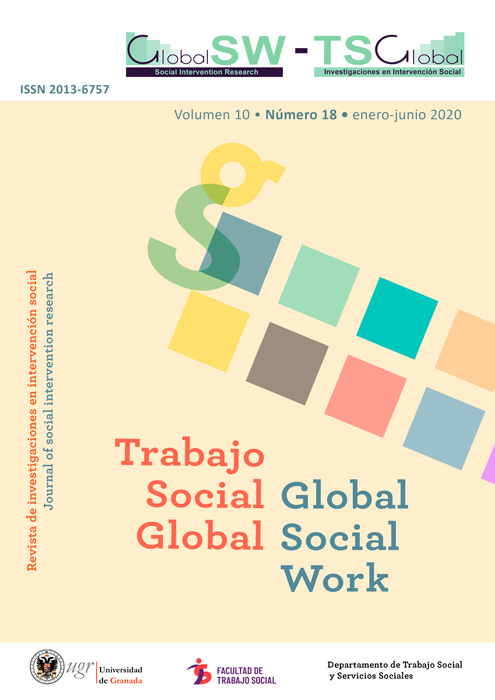El trabajo comunitario en la gestión del Poder Popular en Cuba a nivel provincial
DOI:
https://doi.org/10.30827/tsg-gsw.v10i18.10285Palabras clave:
Comunidad, Participación popular, Consejo PopularResumen
La intervención comunitaria en Cuba se organiza a partir de las funciones de los gobiernos locales y las estructuras de los Consejos Populares. Aunque se acumulan más de diez años de experiencia práctica, en la provincia de Pinar del Río se detectaron problemas en su realización. El estudio partió de la hipótesis de un vínculo entre la problemática y la percepción de los representantes gubernamentales, por lo que se propuso como objetivo explorar dichas percepciones en su relación discurso-experiencias de trabajo comunitario. Para cumplir el propósito, se empleó el enfoque metodológico cualitativo y la metodología para la investigación de los “temas generadores” de Paulo Freire. Las percepciones de los participantes fueron agrupadas en cuatro unidades de análisis: psicosocial, físico-geográfica, cultural y compleja, lo que desveló la transversalidad de la primera desde una visión de lo colectivo en el ámbito comunitario. Se concluyó que la hipótesis de la investigación no era verdadera, y que el problema estaba en el diseño del trabajo comunitario en base a los saberes académicos, y no al conocimiento y la experiencia de sus principales actores comunitarios.
Descargas
Citas
Alonso, M. (1999). La investigación cualitativa. Características, métodos y técnicas fundamentales. En Colectivo de autores (Ed.). Metodología de la investigación cualitativa. Selección de textos (pp. 7-18). La Habana: Editorial Caminos.
Asamblea Nacional del Poder Popular. (Noviembre de 2017). Manual del funcionamiento interno de las Asambleas Locales del Poder Popular. La Habana. Cuba.
Barrault, O., Chena, M., Muro, J., Plaza, S. y Díaz, I. (2016). Consideraciones sobre el trabajo comunitario desde la perspectiva de equipos estatales y ONG. Revista Psicología, Conocimiento y Sociedad, 5(2), 7-33. Recuperado de: https://revista.psico.edu.uy/index.php/revpsicologia/article/view/262
Díaz-Canel, M. (13 de diciembre de 2016). Discurso en la XXIV Sesión Ordinaria de la Asamblea Provincial del Poder Popular en Villa Clara. Cuba.
Freire, P. (2009). Pedagogía del oprimido. La Habana: Editorial Caminos.
Gómez, E. (2008). Geopolítica del desarrollo comunitario: reflexiones para trabajo social. Revista Ra Ximhai, 4(3), 519-542. Recuperado de: http://www.revistas.unam.mx/index.php/rxm/article/view/6984
González, F. (2008). Subjetividad social, sujeto y representaciones sociales. Revista Diversitas, 4(2), 225-243. doi: https://doi.org/10.15332/s1794-9998.2008.0002.01
Grupo Ministerial para el Trabajo Comunitario Integrado (1996). Proyecto de Programa de Trabajo Comunitario Integrado. La Habana: MINSAP.
Hernández, R., Fernández, C., y Baptista, P. (2010). Metodología de la investigación. (5ª ed.). Mexico D.F.: McGraw-Hill Interamericana Editores
Ley nº91 de los Consejos Populares, 13 de julio de 2000, Gaceta Extraordinaria de la República de Cuba, 25 de julio de 2000, nº 06/2000. Recuperado de: https://www.gacetaoficial.gob.cu/es/gaceta-oficial-no006-extraordinaria-de-2000
Marchioni, M. (2014). De las comunidades y de lo comunitario. Revista Espacios Transnacionales, (3), 112-118.
Recuperado de: http://espaciostransnacionales.org/tercer-numero/reflexiones-3/comunidadesycomunitario/
Partido Comunista de Cuba. (2017). Lineamientos de la Política Económica y Social del Partido y la Revolución para el período 2016-2021. En Documentos del 7mo. Congreso del Partido aprobados por el III Pleno del Comité Central del PCC el 18 de mayo de 2017 y respaldados por la Asamblea Nacional del Poder Popular el 1 de junio de 2017 (p.27). Cuba: Impresos en la UEB Gráfica. Empresa de Periódicos. Recuperado el 6 de septiembre de 2019 de: https://planipolis.iiep.unesco.org/en/2017/lineamientos-de-la-pol%C3%ADtica-econ%C3%B3mica-y-social-del-partido-y-la-revoluci%C3%B3n-para-el-per%C3%ADodo-2016
Rodríguez, A.R. y Montenegro, M. (2016). Retos contemporáneos de la Psicología Comunitaria: Reflexiones sobre la noción de comunidad. Revista Interamericana de Psicología, 50(1), 14-22. doi: https://doi.org/10.30849/rip/ijp.v50i1.40
Rojas, R. (2013). El liderazgo comunitario y su importancia en la intervención comunitaria. Psicología para América Latina, (25), 57-76. Recuperado de: http://pepsic.bvsalud.org/scielo.php?script=sci_abstract&pid=S1870-350X2013000200005&lng=pt&nrm=iso&tlng=pt
Salazar, J., Montero, M., Muñoz, C., Sánchez, E., Santoro, E., y Villegas, J. (2012). Percepción Social. En Psicología Social. (pp.77-109). México D.F.: Trillas.
Telleria, I. (2010). Recuperar la comunidad en clave democrática. En Eva Martínez y Lucía Peña (Coord.), III Jornada de Trabajo Social: redefiniendo el trabajo comunitario. (pp. 39-47). España: Gráficas Vicuña. Recuperado de: https://www.cgtrabajosocial.es/files/5178667c6eda7/III_JORNADA_TRABAJO_SOCIAL_COMUNITARIO.pdf
Vecina-Merchante, C. (2016). Las representaciones sociales sobre el rol de cada uno en la comunidad, una barrera para la participación y el trabajo conjunto. Trabajo Social Global. Revista de Investigaciones en Intervención social, 6(10), 3-26. Recuperado de: https://revistaseug.ugr.es/index.php/tsg/article/view/3837/pdf
Descargas
Publicado
Cómo citar
Número
Sección
Licencia
Las personas autoras que publican en esta revista están de acuerdo con los siguientes términos:
- Las personas autoras conservan los derechos de autoría, garantizando a Trabajo Social Global-Global Social Work el derecho a la primera publicación del trabajo que remiten a la revista para que sea sometido al preceso editorial.
- Autores y autoras conocen que su obra se publica bajo una Licencia Creative Commons que permite a otros compartirla con un reconocimiento de la autoría del trabajo y de su publicación inicial en esta revista.
- Los/as autores/as ceden a Trabajo Social Global-Global Social Work los derechos de explotación de la obra que haya sido publicada en esta revista, autorizando a la Editorial de la misma para el ejercicio de una libre reproducción, distribución y comunicación pública. Autores y autoras conocen que su obra será almacenada en servidores y reproducida en soporte digital para su incorporación a repositorios institucionales y bases de datos que facilitarán el acceso libre y gratuito al texto completo de la obra.
- Los/as autores/as pueden distribuir la versión post-print de la obra publicada en TSG-GSW (por ejemplo, situarlo en un repositorio institucional o publicarlo en un libro), con un reconocimiento expreso de su publicación inicial en esta revista.
Los derechos de copyright sobre los textos publicados en Trabajo Social Global-Global Social Work, así como la política editorial de la misma respecto al auto-archivo o depósito en repositorios institucionales o temáticos, están identificados en la base de datos Dulcinea.






















